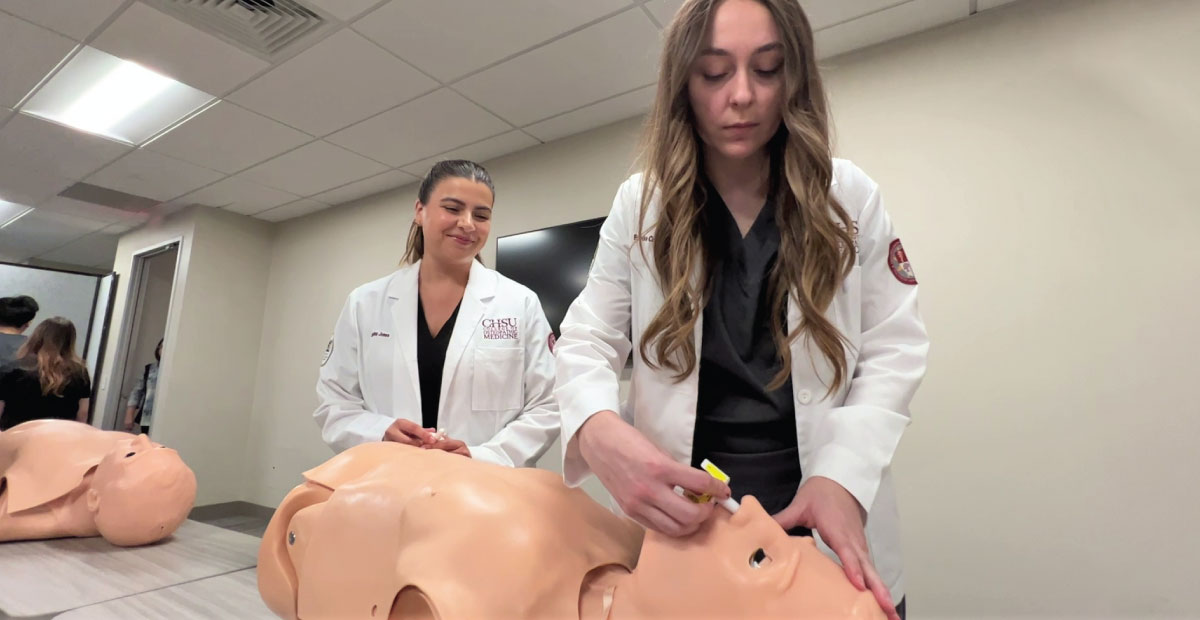CHSU Medical Students Become Certified NARCAN Trainers
October 21, 2022

A program to certify medical students as NARCAN® Nasal Spray Trainers began in October at California Health Sciences University (CHSU). Over 80 medical students in the CHSU College of Osteopathic Medicine participated in the first training session.
The NARCAN® certified training was offered through the CA Bridge Navigator Program, which launched in 2018 to expand access to medications used to treat opioid use disorder through Emergency Departments.
“Our goal is to have all CHSU medical students become certified trainers and have NARCAN® available for distribution to the community,” stated, Dr. Francisco Ibarra, Emergency Medicine Clinical Pharmacist at Community Regional Medical Center in Fresno, and Adjunct Assistant Professor at California Health Sciences University College of Osteopathic Medicine.
“They will be caring for and educating Valley patients. We see a lot of opioid overdoses and actually deaths here that could be prevented,” Dr. Ibarra added.
The education portion of the training was conducted by Rais Vohra, MD, UCSF Professor of Clinical Emergency Medicine and Clinical Pharmacy; Interim Health Officer, Fresno County Department of Public Health; and Medical Director, California Poison Control System Fresno-Madera Division. Dr. Vohra shared his experiences as an emergency medicine physician with administering the life-saving naloxone to patients who overdosed.
“I think of NARCAN® as the best antidote to ensure fentanyl does not claim lives. We know it works well in the emergency department and ambulance services, and now we really need people to have it in their own homes and wherever people might be overdosing,” said Dr. Vohra.
Dr. Cassie DeWitt and Dr. Marcus Olivares-Perez, second-year emergency medicine residents, along with Stephanie Garcia Martinez, Juan Gutierrez, and Joseph Pool, Substance Use Navigators from area hospitals, helped answer questions and provided the hands-on training for the NARCAN® Nasal Spray. Using training devices, the medical students learned to administer the nasal spray on manikins in the CHSU Simulation Center.
Second-year medical student leaders in the Student Osteopathic Medical Association (SOMA) club at CHSU also helped facilitate the training. Brooke Crosswhite, SOMA’s Overdose Prevention Task Force Leader, and Sabrina Jones, President of CHSU’s SOMA chapter, plan to organize opportunities for medical students to distribute NARCAN® and train people to properly use it at health fairs, schools, and during clerkships and rotations.
In addition to helping save a life when a patient overdoses, the medical students were taught to be compassionate to those with opioid use disorder and help connect them to recovery resources and Substance Use Navigators for additional support and assistance.
According to the CA Bridge website, Substance Use Navigators support treating opioid use disorder in the hospital emergency department with immediate access to medication for addiction treatment, navigation to ongoing care in the community, and ongoing training, resources, and mentorship.
“We’re working with vulnerable populations and people who may not have a consistent network of support. You could be the first person to show them that you are there for them when they’re ready to take that first step, with no judgement and no stigma surrounding their decision,” stated Brooke Crosswhite.